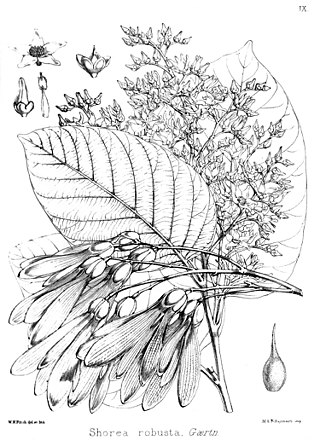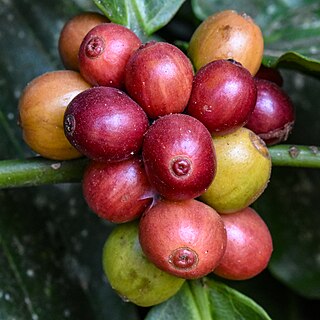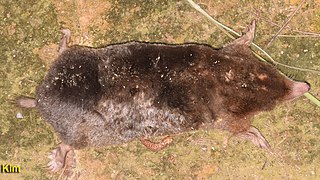
Shorea robusta, the sal tree, sāla, shala, sakhua, or sarai, is a species of tree in the family Dipterocarpaceae. The tree is native to India, Bangladesh, Nepal, Tibet and across the Himalayan regions.

Coffea canephora is a species of coffee plant that has its origins in central and western sub-Saharan Africa. It is a species of flowering plant in the family Rubiaceae. Though widely known as Coffea robusta, the plant is scientifically identified as Coffea canephora, which has two main varieties, robusta and nganda.

Agathis robusta, commonly known as Dundathu pine, kauri pine, Queensland kauri (pine), Australian kauri (pine) or smooth-barked kauri, is a coniferous tree in the family Araucariaceae. Although some common names use the word 'pine' it is not a true pine, having leaves rather than needles. It has a disjunct distribution, occurring in Papua New Guinea and two locations in Queensland, Australia.

Washingtonia robusta, known by common name as the Mexican fan palm, Mexican washingtonia, or skyduster is a palm tree native to the Baja California peninsula and a small part of Sonora in northwestern Mexico. Despite its limited native distribution, W. robusta one of the most widely cultivated subtropical palms in the world. It is naturalized in Florida, California, Nevada, Arizona, New Mexico, Hawaii, Texas, parts of the Canary Islands, Spain, Portugal, France, Italy, Malta, Croatia, Montenegro, Albania, Greece, Turkey, Cyprus, Israel, Palestine, Jordan, Lebanon, Syria, Iraq, Saudi Arabia, Somalia, Bahrain, Qatar, United Arab Emirates, Oman, Yemen, Iran, Afghanistan, Egypt, Libya, Tunisia, Algeria, Morocco, and Réunion,.

Grevillea robusta, commonly known as the southern silky oak, silk oak or silky oak, silver oak or Australian silver oak, is a flowering plant in the family Proteaceae, and accordingly unrelated to true oaks, family Fagaceae. Grevillea robusta is a tree, and is the largest species in its genus. It is a native of eastern coastal Australia, growing in riverine, subtropical and dry rainforest environments.

Eucalyptus robusta, commonly known as swamp mahogany or swamp messmate, is a tree native to eastern Australia. Growing in swampy or waterlogged soils, it is up to 30 m (100 ft) high with thick spongy reddish-brown bark and dark green broad leaves, which help form a dense canopy. The white to cream flowers appear in autumn and winter. The leaves are commonly eaten by insects and are a food item for the koala. It is an important autumn-winter flowering species in eastern Australia and has been planted extensively in many countries around the world. Its timber is used for firewood and in general construction.

The Ussuri mole or large mole, is a species of mammal in the family Talpidae, formerly treated as a subspecies of the Japanese mole. It is found in China, North Korea, South Korea, and Russia and lives in a long burrow, seldom emerging on the surface of the ground during the day.

The orange nectar bat is a species of bat in the family Phyllostomidae. It is found in Colombia, Costa Rica, Ecuador, Nicaragua, Panama, Peru, and Venezuela.

Coffea liberica, commonly known as the Liberian coffee, is a species of flowering plant in the family Rubiaceae from which coffee is produced. It is native to western and central Africa, and has become naturalised in areas including Colombia, Venezuela, the Philippines, Borneo and Java.

ROBUSTA is a nano-satellite scientific experiment developed by the University of Montpellier students as part of a Centre National d'Études Spatiales (CNES) call for student projects in the field of orbital systems.

The Philippine dawn bat is a species of megabat in the family Pteropodidae found in the Philippines.

Strasburgeriaceae is a small family of flowering plants in the order Crossosomatales, only found in New Zealand and New Caledonia. It contains two genera, Strasburgeria and Ixerba. Both genera have simple, evergreen, alternated leaves, often in worl-like clusters, with gland-tipped serrations, hermaphroditic, pentamerous flowers with persistent sepals, clawed petals, flat and long filaments that extend beyond the petals and a persistent style with a punctiform stigma.

Shorea robusta seed oil is an edible oil extracted from the seeds of Shorea robusta. Shorea robusta is known as the Sal tree in India. Sal is indigenous to India and occurs in two main regions separated by the Gangetic Plain, namely the northern and central Indian regions. The plant belongs to the Dipterocarpaceae botanical family.

Pterolophia is a genus of longhorn beetles of the subfamily Lamiinae, containing the following species:

ROBUSTA-1B is a nano-satellite (Cubesat) scientific experiment developed by the University of Montpellier students, a successor to the ROBUSTA satellite, which was launched in February 2012 and lost soon after.
Chelonides is a genus of late Jurassic turtle from marine deposits in Lower Saxony, Germany.
Kahawa Sūg, also known as Sulu coffee or Sulu robusta, is a single-origin coffee varietal grown by the Tausug people of the Sulu Archipelago, Philippines. It is a robusta cultivar, belonging to the species Coffea canephora. It originates from robusta plants introduced to Sulu in the 1860s. It is an important part of traditional Tausug culture. It is mostly consumed locally, though it has started being exported more widely in recent years. It is currently endangered by the introduction of modern higher yield coffee varieties.

Solitudo is an extinct genus of tortoise that was found during the Pliocene and Pleistocene on the Mediterranean islands of Menorca, Malta and Sicily. The genus includes three described species, Solitudo robusta, Solitudo gymnesica and Solitudo sicula as well as a likely fourth, undescribed species from Monte Pellegrino in Sicily. Solitudo sicula, the youngest of the species, died out approximately 12.5 thousand years BP. The largest species, Solitudo gymnesica, has been estimated to have reached a carapace length of 1.1–1.3 m (3.6–4.3 ft).















